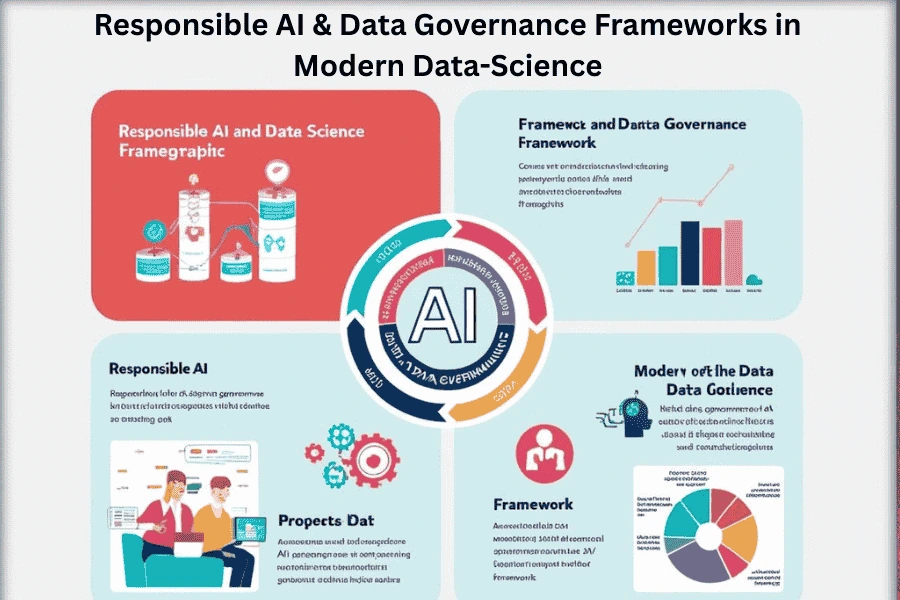The Responsible AI & Data Governance Frameworks in Modern Data Science
Introduction
As organizations increasingly embrace artificial intelligence (AI) and machine learning technologies, ensuring these systems are ethical, transparent, and compliant with legal and societal standards becomes essential. Responsible AI and data governance frameworks are critical to achieving this goal. These frameworks help organizations develop trustworthy AI systems while safeguarding data privacy, security, and compliance. This article delves into the importance of Responsible AI, its relationship with data governance, and the best practices for implementing frameworks that govern AI and data management.

Ethical AI: Ensuring Fair and Transparent Data Insight Generation
What is Responsible AI?
Responsible AI refers to the design and deployment of AI systems that are ethical, transparent, and fair, ensuring they align with societal values. The key principles of Responsible AI include fairness, accountability, transparency, privacy and security, and ethical use. Fairness ensures that AI systems do not perpetuate bias or discrimination. Accountability establishes clear responsibility for AI outcomes, while transparency ensures that AI decision-making processes are understandable and traceable. Moreover, responsible AI focuses on privacy and security to protect sensitive data and comply with regulations like GDPR. Lastly, ethical use ensures that AI technologies are employed for positive, non-harmful purposes, particularly in industries such as healthcare, hiring, and risk management.
The Role of Data Governance in Modern Data Science
Data governance is a critical element in ensuring the ethical and effective use of data in AI systems. It refers to managing data throughout its lifecycle to ensure its availability, usability, integrity, and security. A solid data governance framework incorporates several key components, including data quality management, which ensures that AI models rely on accurate, consistent, and reliable data. Data privacy and security measures safeguard sensitive data and ensure compliance with privacy regulations such as GDPR, HIPAA, and CCPA. Data stewardship involves assigning responsibility for managing and protecting data, while data accessibility and transparency ensure that authorized users have access to data, and data use remains transparent. Without robust data governance, organizations risk using inaccurate or non-compliant data, potentially leading to unethical outcomes and legal challenges.
Challenges in Implementing Responsible AI & Data Governance
- Bias in Data: One of the primary challenges is eliminating bias in datasets. Historical biases can be unintentionally incorporated into AI models, leading to unfair outcomes. It requires continuous effort to ensure that the data used is representative and free from biases.
- Complexity in Compliance: Data privacy laws like GDPR and CCPA vary across regions and require businesses to maintain detailed records of data usage. Ensuring compliance with these regulations can be complex and resource-intensive.
- Data Security: As AI systems often handle vast amounts of sensitive data, maintaining high levels of security becomes a challenge. Data breaches or misuse of data can have serious ethical and legal consequences.
- Lack of Transparency: Many AI models, deep learning models, operate as "black boxes," making it difficult for stakeholders to understand the decision-making process. Achieving transparency in these systems is a significant hurdle.
- Scalability: As organizations scale their AI operations, maintaining consistent data governance practices and ethical standards across multiple systems and datasets can become difficult.
Implementing Responsible AI & Data Governance Frameworks
First, establishing clear governance structures is essential by assigning dedicated teams to both AI governance and data governance, with roles such as ethical AI officers and data stewards to enforce policies and guidelines. Next, organizations should adopt ethical guidelines and frameworks that prioritize fairness, transparency, and accountability, leveraging established principles like Fairness, Accountability, and Transparency (FAT). Ensuring data privacy and security is another critical practice, requiring the implementation of robust data security protocols to protect sensitive information and comply with regulations like GDPR. To maintain ethical standards, continuous monitoring and auditing of both AI systems and data governance processes are necessary to ensure compliance and fairness. Furthermore, educating and training stakeholders through ongoing programs is crucial to keep teams informed about AI ethics, data privacy regulations, and the significance of inclusivity in data collection. Lastly, organizations should implement explainability in AI models, making decision-making processes more transparent and understandable for non-technical stakeholders, thus fostering trust in AI systems.
Conclusion
As AI continues to shape various industries, ensuring its responsible deployment is crucial. By adopting Responsible AI frameworks and implementing robust data governance practices, organizations can create AI systems that are high-performing, ethical, transparent, and compliant with legal regulations. Integrating AI governance best practices with data governance frameworks will minimize risks such as bias, non-compliance, and unethical behavior. Ultimately, the future of AI depends on organizations balancing technological innovation with ethical responsibility, ensuring AI can be a force for good in society. To learn more about how data governance supports ethical AI development, read our detailed guide on
Active Events
Transition from Non-Data Science to Data Science Roles
Date: Aug 07, 2025 | 7:00 PM (IST)
7:00 PM (IST) - 8:10 PM (IST)
2753 people have registered
Unlocking Lucrative Earnings: Mastering Software Engineering Salaries
Date: Aug 05, 2025 | 7:00 PM(IST)
7:00 PM(IST) - 8:10 PM(IST)
2811 people have registered
Bootcamps
Data Science Bootcamp
- Duration:8 weeks
- Start Date:October 5, 2024
Full Stack Software Development Bootcamp
- Duration:8 weeks
- Start Date:October 5, 2024
